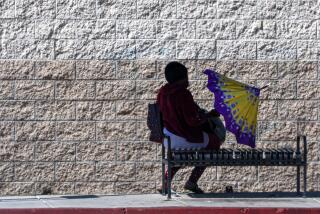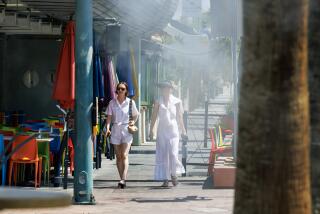Last gasp of heat wave brings Flex Alert, red flag warnings and new records

Southern California’s coastal areas cooled considerably early Friday, but much of the region still sweltered under a lingering heat wave that moved into its fifth day.
Patchy fog blanketed parts of Los Angeles County, bringing a slight chance of showers before warming during the day to 87 degrees. Parts of the coast cooled, with a high of 72 in Santa Monica, 72 in Long Beach and 70 in Newport Beach. Much hotter temperatures were seen inland, with 110 degrees in Lancaster, 93 in Riverside, 94 in Ontario, 91 in Temecula and 80 in Santa Ana. Humidity levels also remained high.
The California Independent System Operator, which monitors power lines across the state, extended its Flex Alert a second day, from 6 to 9 p.m. Friday, to encourage reduced energy use because of the strain on the state’s power grid. Residents were advised to avoid lowering the thermostat during these hours and to complete tasks involving high amounts of energy beforehand, such as using major appliances and the charging of electric cars.
Gov. Gavin Newsom has signed an emergency proclamation to reduce grid-based power usage by allowing for backup generators and suspending certain permitting requirements.
Officials are hoping voluntary power reductions will help avoid the types of problems that led to power shut-offs in some areas during last year’s heat waves. In August, the ISO declared a statewide Stage 3 emergency for the first time since 2001 because of excessive heat driving up electricity use, and the agency ordered utilities to implement power disruption programs.
Consumers are asked to limit their electricity use between 5 and 10 p.m. to avoid the shutoffs that happened during last year’s heat waves.
The National Weather Service said that the region should start to see cooler temperatures beginning this weekend, with temperatures in coastal areas in the low 80s by Saturday and the high 70s by Monday. But excessive heat warnings for inland and valley areas are expected to remain in place until 9 p.m. Sunday.
Meanwhile, the heat wave that has blanketed Southern California has either matched or set new records in some spots. On Thursday, Palm Springs reached 123 degrees, matching the highest maximum temperature record set on three previous occasions: on Aug. 1, 1993; July 28, 1995; and July 29, 1995. Ocotillo Wells — located southeast of Borrego Springs, which reached a record of 118 Thursday — also hit 123 degrees, according to the San Diego Union-Tribune. The reading appears to be the second-highest temperature ever recorded in San Diego County.
Thermal, the appropriately named California town just south of Coachella and west of Joshua Tree National Park, also set a record with 118, according to the weather service. Idyllwild reached 96, breaking its 1961 record of 92, and Big Bear set a new record at 88 degrees. Other records from Thursday include Lancaster (111), Palmdale (109), Paso Robles (109) and Sandberg (101).
Parts of Inyo County, around Death Valley National Park, were under a red flag warning until 8 p.m. Friday for potential fire conditions. The region saw a few thunderstorms as well as some dry lightning strikes in Death Valley, according to the National Weather Service.
A sliver of Northern California, around the Modoc National Forest, is under a red flag warning from 3 to 9 p.m. Saturday.
The heat persists in many parts of the county, such as the Santa Clarita Valley, where a heat advisory is in effect until 9 p.m. Saturday.
Mountains across Los Angeles County and reaching into Ventura and Santa Barbara County ranges are still under an excessive heat warning that has been in effect most of the week and lasts until 9 p.m. Saturday.
Times staff writer Leila Miller contributed to this report.
More to Read
Sign up for Essential California
The most important California stories and recommendations in your inbox every morning.
You may occasionally receive promotional content from the Los Angeles Times.











